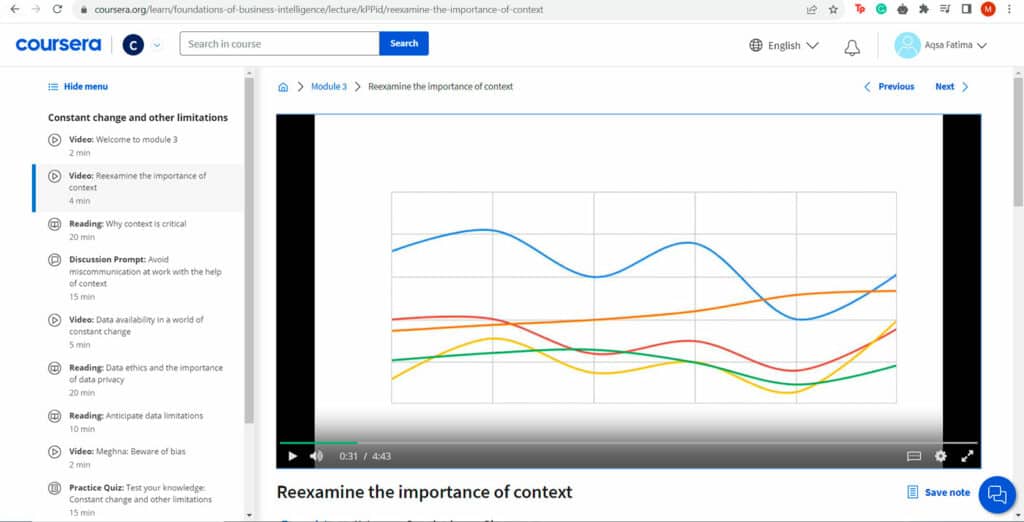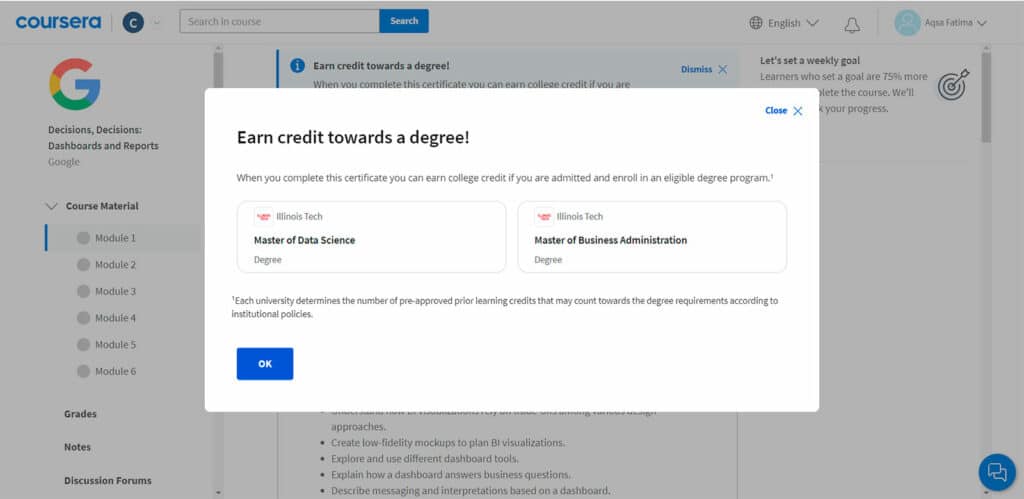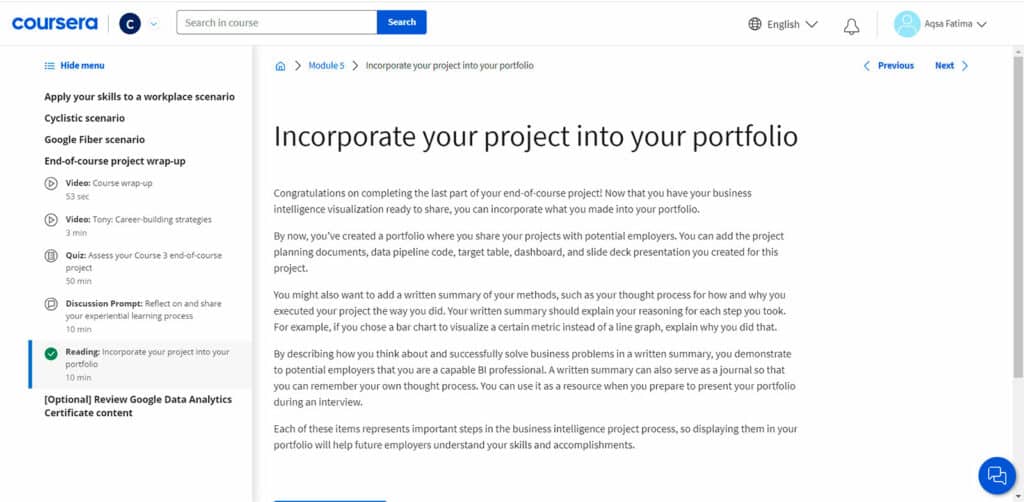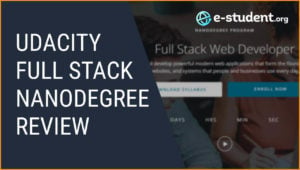
Ron Finley’s MasterClass Review: Gangsta Gardener
Ron Finley’s mission of growing food on the sidewalk has helped make concrete jungle green. In this review, we’ll look into the lessons he has to share for both gardening and community empowerment.
With entry-level Business Intelligence roles paying an average salary well over $90,000, is the Google Business Intelligence Professional Certificate the right place for those wanting to transition to this career?
E-student.org is supported by our community of learners. When you visit links on our site, we may earn an affiliate commission.
4.0 / 5
The Google Business Intelligence Professional Certificate on Coursera is a well-structured program with in-depth training for professionals in the data analytics field who want another tool added to their skills. Students who have already graduated from prior courses in data analysis and have acquired analytical and problem-solving skills can also go for this program. Over three courses, this certificate program covers the essentials of Business Intelligence along with personal career stories from the people at the heart of Google.
Although Business Intelligence seems to have gained popularity only with the rise in computer-based systems, there is evidence that this profession helped drive business more than a hundred years ago as well. In one of the lectures, we see the book that first mentioned the term Business Intelligence and that was in 1865!

The question then arises whether a profession that has been building over a century is the right choice for you and, more importantly, whether the Google Business Intelligence Professional Certificate on Coursera is the ideal pathway toward this career. We will answer these questions in this article as we review this program in detail, highlighting the course structure, prerequisites, and what other students are saying about it.
The Google Business Intelligence Professional Certificate covers the essentials of what Business Intelligence (BI) is, the tools and technologies that BI Analysts often use, and the kind of skills needed to make a successful career out of it. It has three courses, which can be completed in two months if the student spends 10 hours per week on it.
The first course, Foundations of Business Intelligence, starts with the difference between BI and data analysis, as these are two fields that are often confused with one another despite having vastly different responsibilities. Next, the student will be able to see how data is used to make important decisions for an organization and how it can be used more efficiently by using BI tools and BI concepts.
The second course, The Path to Insights: Data Models and Pipelines, turns things more technical by helping students determine the appropriate data models according to business requirements and answer the right type of questions. It also covers the process of extracting, transforming, and loading (ETL) and the tools available for data storage systems. The students also get to work through SQL, BigQuery, and other technologies.

The last course, Decisions, Decisions: Dashboard and Reports, allows the student to present data visually so an informed decision can be made based on business needs. Building dashboards that show real-time data is an important part of a BI Analyst position, as discussed during the first course as well.
By the end of each course, the student gets to solve a real-world problem scenario by acting as a professional in BI. Please note that I had full access to the paid program and hence, I could attempt the quizzes and projects. You can also audit the course to get access to video lectures, readings, discussion prompts, and project requirements for free, but you will not get a certificate of completion by the end. However, this option is very useful if you wish to try out the program before investing.
This Professional Certificate is at the Advanced level. This means that it requires you to have some prior knowledge related to Business Intelligence and this includes analytical principles, skills, and tools.
It is recommended to complete Coursera’s Google Data Analytics Professional Certificate before enrolling in this program. Google Data Analytics is an 8-course series that is beginner-friendly and can take up to 6 months to complete. It covers skills such as data cleaning, problem-solving, critical thinking, data ethics, and data visualization.

Many of the concepts learned in the Google Data Analytics certificate are further expanded upon in the Google Business Intelligence Certificate, such as concepts like data types, primary and foreign keys, and technologies such as BigQuery and SQL. Hence, unless you already have a solid background in data analytics, it’s essential to complete the Data Analytics course before this one.
This course alone costs $49 per month with a 7-day free trial period. Since the courses are self-paced, the faster you go, the more money you save. For example, this program is estimated to be completed in 2 months if you spend 10 hours a week. However, if decide to spend 20 hours per week on it, you will complete it in just one month. Then you can go on to cancel the subscription and you’ve got the certificate for $49 instead of $98.
Alternatively, you can also purchase a Coursera Plus subscription, which costs $59 per month or $399 per year with a 14-day money-back guarantee and can give you access to not only this single Professional Certificate but thousands of other courses, projects, and certificates as well. If you wish to use Coursera for a longer run, this is the ideal option to go for. For this certificate, this subscription will add up to $118 for two months. This also starts with a 7-day free trial.
The option to apply for Financial Aid is also available for each course in the Professional Certificate separately. The application includes details about your education level, annual income, and the reason you’re asking for aid. After submission, it takes 16 days to get the results and if it’s approved, you can enroll in the course with a 75% discounted price.

This Professional Certificate boasts a positive career outcome, such as a new job, promotion, or raise within 6 months of completion for 75% of the graduates. These statistics are based on the program graduate survey responses in 2022. Moreover, according to Lightcast Job Postings US, there were over 166,000 job openings in Business Intelligence alone, and the median salary for entry-level roles was $96,000. With all these positive factors, there is no doubt that this certificate by Google is truly worth it.
Apart from lectures that are delivered by seasoned professionals in this field, there are also hands-on projects at the end of each course that exactly replicate a real-world scenario that a Business Intelligence professional may need to solve. The requirements are detailed and complex, and working through them helps the student build the required analytical and problem-solving skills to be successful in this career.

Although it’s recommended to take this course after you’ve completed Coursera’s Google Data Analytics Professional Certificate, for those who can’t do so (or if you need a refresher on the topics covered), this course has an optional section at the end of each module in each course. This section contains lecture videos of any terms or technologies mentioned in the previous course that may be useful to help understand concepts in this course. Having this completely free additional content is another reason why an investment in this Professional Certificate is a great option if you’re planning to transition to a career in Business Intelligence.
The complete certificate program has three courses:
The first two courses of this certificate are divided into four modules each. The third course is longer and has six modules. Each module is tagged with estimated hours in which it can be completed. Each course of this certificate concludes with an end-of-course project that uses a real-world scenario to help the student test their analytical skills. Apart from lecture videos and hands-on projects, each course also has discussion prompts, practice quizzes, marked quizzes, readings, activities, and interactive plugins that summarize the key concepts for you.

The instructors are from Google and they are part of the Google Career Certificates program which aims to help professionals and students alike by training them in tools that will help grow their skills, careers, and businesses.

The first course is taught mainly by Sally, a Business Intelligence Analyst at Google, who transitioned from a career as a biomedical researcher, along with Anita, a Senior Business Intelligence Analyst at Google, who was previously a librarian. It also has appearances from other Google professionals to add to their personal experiences within this field.
The second course is taught by Ed, a Product Manager at Google, who has dealt with imposter syndrome himself and teaches you how to overcome it, among many other things. The last course in this program is taught by Terrence, another Business Intelligence Analyst at Google.
Each course starts with some introductory lectures with the course instructor. After each concept is explained in a lecture video, there is a discussion prompt with a question or topic that you can add your thoughts about, and also read what your classmates’ said and comment on them. There is a short, un-graded quiz for each section as well, along with reading materials, glossary terms, and interactive plugins.
Except for the last modules, each module in each course ends with a graded quiz that has at least 10 multiple-choice questions and it’s required to score at least 80% to pass. You can re-attempt a quiz three times every 24 hours. The due date for each quiz is given in the upper right corner. If you have missed it, simply go to the home page of the course and reset your deadlines.

The last module of each course has an end-of-course project, such as making a project requirement document after gathering requirements from stakeholders or developing a data pipeline for a real-world scenario. The projects do not get feedback from course instructors but instead, you’re given a rubric on which you can score your project to see how well you did.

The first course of this Professional Certificate is divided into four modules and covers the basics of what Business intelligence is and how it works as a profession to impact organizations. It also teaches you the most important aspect of this path, which is the correct use of data.
Module 1 teaches you how organizations and teams can benefit from business intelligence and then moves on to the personal career journey of a Business Intelligence Analyst at Google. The next section describes the difference between Data Analytics and Business Intelligence and walks you through the three phases that data experiences during the business intelligence process. Lastly, this module closes off by explaining the complexities of making intelligent decisions and how effective strategies require you to have a 360-degree view of the organization.

Module 2 introduces you to the different types of BI stakeholders and what each stakeholder requires from you. Communication is an important part of the Business Intelligence position, and this module teaches you the best practices for engaging with stakeholders or people within your organization to relay the importance of real-time monitoring.
For data, context is very important. Without context, data can be misinterpreted, and wrong decisions can be made, leading to huge losses for the organization. This is the main theme in Module 3. It teaches you the common limitations of data and how to make sure each data used in Business intelligence has a purpose and is actionable.

The last module of the course makes things interesting by allowing you to practice everything you’ve learned on the course with a hands-on project. You’ll learn how to extract meaningful information from workplace scenarios to prepare an efficient project planning document, one of the most important documents in Business Intelligence.
This course is also divided into four modules where the last module continues the project from the previous course by creating a pipeline process for it. In complement to the concepts taught in this course, the project shows the student how database systems are designed and how to optimize BI tools to get the most optimal results.
The first module in this course introduces you to what database models and schemas are and which are appropriate for which kind of data. Next, you learn the “Extract, Transform, Load (ETL)” process and the different types of data pipelines. Many topics covered in this course require you to have some technical background, as it can be hard to digest for complete beginners.
The second module dives into more detail about database systems, including data marts, data lakes, and data warehouses. The students get guidance on how to recognize the different aspects of databases, including OLTP and OLAP, along with the factors to consider when it comes to database performance. Real-life case studies help you understand everything better.

Module 3 works with optimization techniques that help make sure data is clean and performs efficiently. Some techniques covered include quality testing, data schema validation, business rule verification, and general performance testing. When BI professionals know these things, they can fight against data issues before they become a huge problem for organizations.
As the course name suggests, this course lets BI Analysts visualize data in the form of dashboards and reports so informed decisions can be made for the organization. It is divided into six modules with the last one just being a program wrap-up with no graded activity. Once you’ve completed this certificate, you can also use it to earn college credit with an eligible degree program!

Module 1 explores dashboards and how they can be used to answer business questions. It also includes an activity to design a low-fidelity data visualization mockup, and after submission, you get access to a completed exemplar, which you can compare to your work to see how well you did or the places you can improve.
Module 2 identifies the obstacles and limitations of dashboards and the privacy concerns when dealing with internal and external data. Solving these issues and analyzing other contributing factors discussed in this module can lead to an increase in processing speed. The activity of this module guides you towards creating a chart in Tableau.

In the third module, you learn to create data-driven charts and then organize them into a dashboard. The activities allow you to role-play as a BI professional and meet clients to practice asking the right questions and testing your communication skills. Module 4 then teaches you the correct way to present your dashboards to the clients and how they can help drive meaningful decisions. An additional section on career focus is also provided, where you get important tips on resume and interview strategies from industry experts at Google.
Finally, Module 5 has the end-of-course project, which concludes the portfolio project you have been working on since the start of this program. The deliverables from the previous two courses will now help you create mockups, design charts, and a dashboard for your workplace scenario. Once complete, this portfolio project can be presented to recruiters to showcase your skillset and creativity.

On Coursera, each course in this certificate has more than 80% 5-star reviews, which shows the students’ satisfaction with the course. It has been praised for in-depth training and for covering essential topics such as Power BI, SQL, and dashboards. There is specific admiration towards the course instructors for having a deep understanding of the subject matter and delivering the content with ease.
For the first course, some more seasoned professionals have called it too basic as it has terms that are “common sense.” Of course, this would not be the case for people who come from a non-technical background. Another user said: “I’m taking this 2 weeks after completing the Google Data Analytics course. This felt like a review, and I could have skipped to the second course. If I was taking this fresh, I would likely have a different opinion.”
Apart from this, professionals and students alike highly recommend this course to start or boost one’s career in the Business Intelligence field.
There are many online courses available on Business Intelligence that more or less cover the same topics as taught in this Professional Certificate program. Here, I will mention the best ones I found that are comprehensive and cost-effective.
If you prefer the lower cost of Udemy courses, there is a course named “Power BI – Business Intelligence for Beginners to Advance” which provides students with a step-by-step learning path to BI tools and powerfully visualizing data. Another relevant course is SQL for Data Analysis: Beginner MySQL Business Intelligence which is perfect for those working with SQL for the first time and want to enter the BI field through this path.
LinkedIn Learning also has multiple courses that come with a LinkedIn Premium subscription at no additional cost. Getting Started as a Business Analyst is a learning path dedicated to teaching students how to gather, document, and analyze business needs and requirements. Another course, Become a Business Intelligence Specialist, covers an extensive range of BI tools such as Microsoft Power BI, IBM Crystal Reports, Google Analytics, and more.
While there are other options available, this Google Business Intelligence Professional Certificate is well-structured and teaches you everything in one program that may be broken down into multiple courses in different places. This makes it more cost-effective, and you also get a Google-credited certificate, which can help you greatly in your job-hunting process.
In conclusion, Coursera’s Google Business Intelligence Professional Certificate is a robust and well-organized program that not only provides lectures on BI concepts but combines them with adequate training to create a practical and enriching learning experience
For everyone planning to enter this field, this program is a great choice. However, this profession itself may not be for everyone. A very important part of this role is strategy-building and as course instructor Sally points out, there can be a huge number of possibilities when it comes to making strategies. For example, mathematicians have now proved that there are more possibilities in a game of chess than there are atoms in the world!
Similarly, Instructor Anita tells you that the skills needed in this field are transferrable, but at the same time also explains how the non-technical side part of these roles is as important, if not more, as the technical side. You may learn how to build dashboards and use SQL, but it is crucial that you also know how to communicate and strategize: things you can only learn outside the classroom, in real life.


Ron Finley’s mission of growing food on the sidewalk has helped make concrete jungle green. In this review, we’ll look into the lessons he has to share for both gardening and community empowerment.

If you’re interested in the Power of Empathy MasterClass, read our honest review of the course and find out if it’s the right fit for you.

Can you really become a well-versed web developer by taking the course?